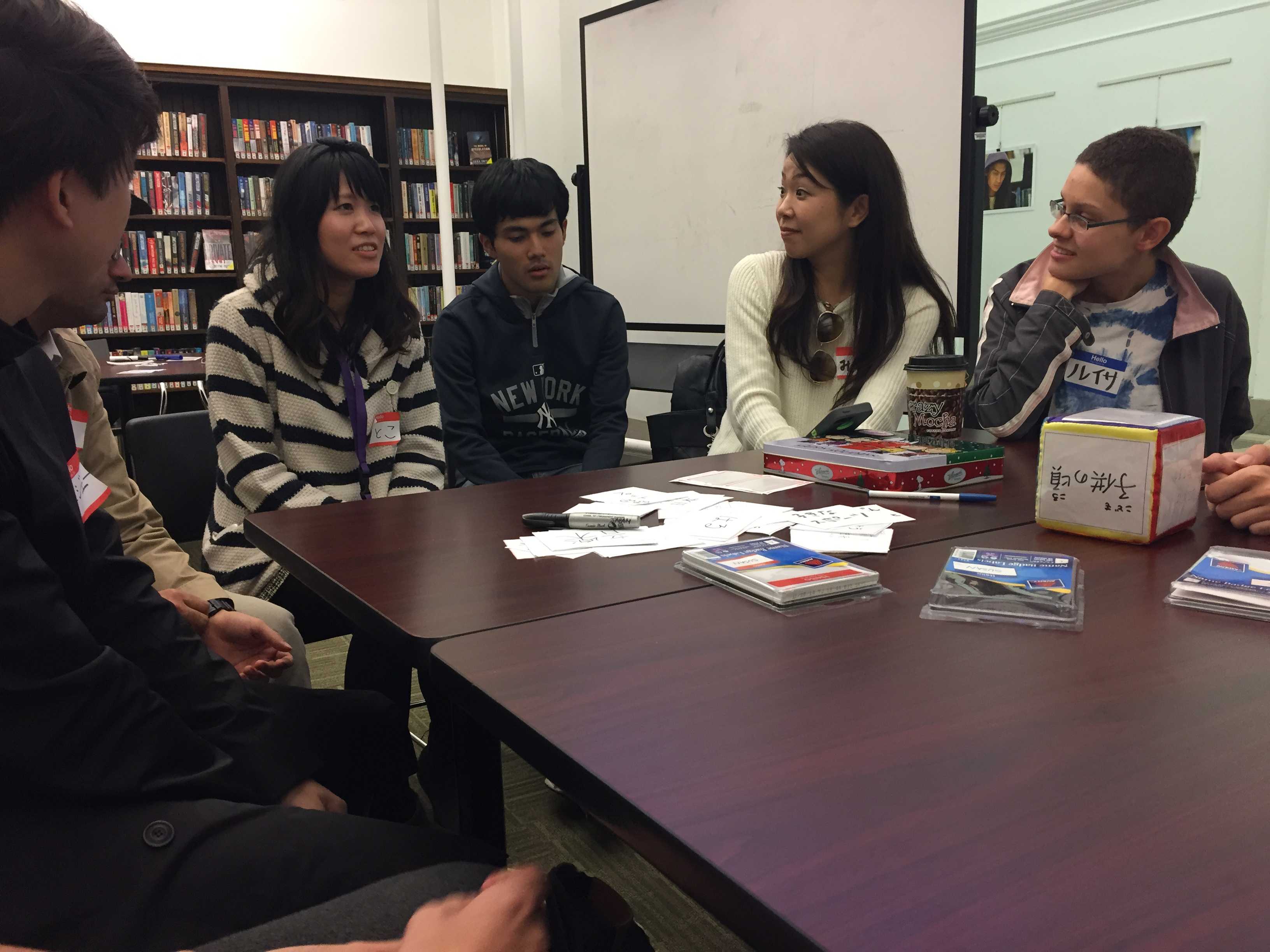Language aloud in library: Carnegie Library offers free language lessons


Every first and third Tuesday of the month, Oakland’s Carnegie Library encourages its visitors to get chatty.
That’s when the Japanese Conversation Club meets, in the library’s large print room. Nearly 20 participants sit at three separate tables. It’s obvious that attendees are familiar with each other and that they’re passionate about the language. They’re bubbly, and conversation moves quickly.
Louisa Lightfoot, a Pitt senior studio arts major, gets the conversation going by tossing a softball-sized fabric block onto a table. She leans forward to read the phrase on the side of the block that’s facing the ceiling, written in Japanese. Five young men and women are seated around the table with her, and they simultaneously lean in to get a better read. A few seconds of comprehension pass, and they break out into smiles.
“Movies,” the block prompts. The young men and women start up a light conversation in Japanese about their favorite films.
In addition to Japanese, the library offers free classes in Chinese, Korean, Arabic, Russian, German, French, Spanish, Italian and English, according to senior librarian Bonnie McCloskey.
“It’s a need,” McCloskey said. She likened this trend to the influx of immigrants who are projected to arrive in the United States in the coming years. Mayor Bill Peduto has said that he expects as many as 500 Syrian immigrants to relocate to the city within the next 18 to 24 months alone.
Each language class has at least one level — an introductory course for beginners or a conversation club for those with more experience. Most languages have classes for both levels, as well as at an intermediate level. Each class typically meets twice a month for an hour as part of a growing trend in libraries across Allegheny County, where nine others are continuing to develop language programs.
“It’s worth it to come,” Lightfoot said. “At school, you learn what you learn. It’s different than spontaneous conversation,” she said, which she can have at the library.
Before coming to the classes, Lightfoot didn’t have any experience speaking Japanese, so she became involved with the free language programs at the Carnegie Library.
Curriculum for each language class restarts each spring, summer and fall. New participants can join casually, as each class breaks into small groups based on skill level, McCloskey said. There’s no actual enrollment or paperwork — all it takes to participate is to walk into the classroom.
Volunteers lead every language class — most are native-speaking immigrants, but some are professors and graduate students. According to McCloskey, the size of a class may range from five to 50 adults and college students, but average class attendance hovers at around 12 to 15 people.
Inspired by the Japanese anime films of Studio Ghibli, Lightfoot first became interested in learning the language when she was in high school. She visited the library regularly, and when she saw a flyer advertising the language class, she decided to get involved.
“I wanted to create movies like that and work on animation,” Lightfoot said, which is why she began attending the free sessions.
Dan Clothiaux, a first-year computer science graduate student at Carnegie Mellon University, started attending classes after he returned from a year in Japan as an undergraduate student, where he learned basic Japanese. He said he wants to keep it in his working memory.
“It’s important [to me] to keep the language up, as a skill,” he said.
Unlike taking formal language classes at a university, Clothiaux said the library’s flexibility is one of the sessions’ main draws.
“There are no time demands, like in a class [at school]. You can come once a month, and it’s not a big deal,” he said.
As of right now, there aren’t enough rooms in the library for classes to meet more than twice a month. McCloskey realizes this isn’t enough practice for someone who seriously wants to become fluent in a language.
That’s why, in addition to classes, the library offers free online language resources to its members. McCloskey recommends Mango Languages, an online program that provides users with reading, writing, listening and speaking practice in 71 languages. Library members can access Mango for free, via the library website.
Kazuyo Good, a library specialist at Pitt, is the main volunteer for the Japanese language classes in the Oakland library. She instructs all three classes at the Oakland location and another class at the East Liberty library.
“What I often see is that participants and volunteers share their curiosity,” Good said.
She sits in and cheerfully participates in her conversation groups. Many of the volunteers in her classes are young Japanese men and women who are living in America temporarily while they’re attending school — a plus not just for the instructors, but for students like Lightfoot, as well.
“Studying another language helps me connect and find commonalities with people who are different than me,” Lightfoot said. “I may now interact with a more international type of mindset.”
Over the last two years, Good introduced children’s programs in addition to her classes.
In addition to the regular language classes, the Oakland library also hosts a list of other language learning seminars and classes, such as an annual Japanese language workshop for children, called Camp Konnichiwa — “hello” in Japanese. Last fall, the festival spanned over four days, and children learned phrases and songs in Japanese.
There’s also the Tomodachi Festival — meaning “friend” — which is a one-day celebration focused on familiarizing children with Japanese culture and customs, involving singing, dancing, costumes and origami.
According to McCloskey, dual-language “story times” for children are cropping up around the city, as well.
McCloskey also leads Let’s Speak English at the library, a class that meets every Wednesday from 5 to 6 p.m., giving non-native speakers an opportunity to practice their English.
Drawing around 25 participants on average each week, it’s the library’s most heavily attended class. McCloskey sees a lot of genuine friendships form, which she finds rewarding.
“These programs are helping to make Pittsburgh a place of love and friendship,” McCloskey said. “I think a lot of people who take the classes become advocates for the library, because they can see how it changes lives and connects people to each other, to cultures, to growing as a person.”
Recent Posts
Marquan Pope: The ultimate shark
One of the most remarkable things about sharks is that an injury doesn’t deter them.…
Who Asked? // Do we really get a summer vacation?
This installment of Who Asked? by staff writer Brynn Murawski mourns the seemingly impossible perfect…
Notes From an Average Girl // Notes from my junior year
In this edition of Notes From an Average Girl, senior staff writer Madeline Milchman reflects…
Meaning at the Movies // The Power of the Movie Theater
In this edition of “Meaning at the Movies,” staff writer Lauren Deaton discusses her love…
EMBRACE sponsors Black Maternal Health Wellness week
Because Black women’s maternal health is not institutionally prioritized, Pitt’s EMBRACE sponsored a Black Maternal…
Local ‘Standing Wave’ coffee truck energizes the Pitt food scene
The small business coffee truck “Standing Wave” has become a beloved new coffee spot on…

